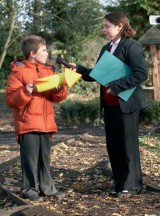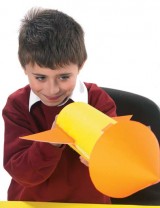Achieving the 'outstanding' Ofsted assessment you deserve needn't be an ordeal. Jackie Beere explains how to impress every classroom visitor
Most of the very best teachers have experienced an unsatisfactory judgement at some time in their careers. Learn from it, and it can work as a positive force in your development; dwell on it, beat yourself up about it, argue about it, and it could be destructive and very demoralising.
Remember, an observation is only a snapshot of your teaching. The aim of my book The Perfect Ofsted Lesson is to make that snapshot look ‘outstanding’, and truly reflect your everyday ‘outstanding’ teaching. The advice it contains is designed to help you achieve the best results you can when an official observer or inspector pays a call, but it will also help you develop your teaching techniques and become the great career teacher you want to be.
 ‘Progress’ is the magic ingredient required for ‘outstanding’ lessons. Think of the learning progress as a journey with uphill struggles, landmarks, signposts, etc., and a very clear and connected destination that resonates with pupils.
‘Progress’ is the magic ingredient required for ‘outstanding’ lessons. Think of the learning progress as a journey with uphill struggles, landmarks, signposts, etc., and a very clear and connected destination that resonates with pupils.
In other words, your students understand where and why they are going and are keen to get there! They will help set the success criteria for achieving the objective and be able to say how well they’re progressing on their learning journey at any time to any observer who cares to ask.
Most importantly, this advice is easy to apply – no matter what subject you teach or what sort of teacher you are. Many different teachers have successfully implemented the strategies offered here and adapted them to suit their different styles, personalities and classes.
Let’s begin with seven simple steps towards creating the ‘perfect’ lesson:
How can you make sure that in the brief time an inspector (or other observer) is in your classroom your lesson ticks enough boxes to impress, and gains that ‘outstanding’ grade? Sharing the criteria for success is essential for any learning experience. If you (or your students) don’t know what you’re expected to strive for, how do you (or they) know they’ve achieved success? To make this work, the students themselves need to engage with exactly what success will look like, feel like and do for them.
Set up the learning environment. The relationships you have with your students are the most important aspect of setting up your learning environment. Get rapport with your class and they will make progress.
A starter should stimulate curiosity and open mindedness, and prepare the brain for learning. They can be random or linked to the subject/prior learning; they must challenge, make connections and stimulate curiosity. Engaging the emotional brain makes your class attentive and ready for learning.

Describe simply and exactly what you want the students to be able to do by the end of the lesson. Even better, get them to describe what great results would look like. Do this at two levels (at least) for differentiation. Setting high expectations is the single most important thing you can do to ensure good progress in learning. Make sure specific groups of students are aware of what they need to do to make progress, paying particular attention to students most at risk of falling by the wayside (FSM, LAC, EAL, etc.), and relentlessly coach them to find ways to move forward as you facilitate the lesson.
This is where the teacher’s input really comes in to facilitate the learning. Include elements of choice (to motivate), collaborative work (to deepen learning) and challenge (to ensure they are moving forward in their learning). When the teacher talks they should stimulate thinking through great questions and offer new learning through their input. Include mini plenaries often when an observer is there.
DIRT is Dedicated Improvement and Reflection Time through assessment as learning. Time to really improve work through re-drafting, reviewing after feedback, pushing for a little more progress towards the objective.
The moment of truth: how far did we get towards our objectives? Find a range of exciting ways for children to demonstrate what they’ve learnt, so you can be sure they know whether they met the objective and can talk about how they did. You can then see what the next steps are for further progress.
 You don’t need the ‘wow’ factor to deliver an excellent lesson, but you do need engaged, enthusiastic and determined students. Nurture this ethos by having very high expectations of your students and by using your expertise to enthuse them about new learning. You also need to be able to accurately measure and respond to the progress they make in your lesson in order to plan the next phase.
You don’t need the ‘wow’ factor to deliver an excellent lesson, but you do need engaged, enthusiastic and determined students. Nurture this ethos by having very high expectations of your students and by using your expertise to enthuse them about new learning. You also need to be able to accurately measure and respond to the progress they make in your lesson in order to plan the next phase.
Your classes have to make a contribution to the value-added results of your school. Therefore your students must move forward with their learning – and know they have and how they did it – so that they can do it again next time. Equally, if they haven’t made enough progress, they need to know why and how to fix it.
An observer or inspector needs to see a learning environment that’s challenging learners to exceed beyond their expectations and feel the tangible excitement of brains making connections to new learning. This will only develop and be evident to observers if this advice becomes part of your everyday practice and is demonstrated in the students’ books and class discussions, and in the classroom dynamics – all of which take time to develop. You’ll know when you get this right because you’ll actually wish every day for someone official to walk through the door and see the fantastic learning going on in your classroom!
Extract taken from ‘The Perfect Ofsted Lesson’ by Jackie Beere, edited by Ian Gilbert © Jackie Beere 2010 ISBN 9781845904609
Jackie Beere is a consultant, trainer, school improvement partner and author. Her latest book, The Perfect Ofsted Lesson is priced &£;8.99 and published by Crown House. Visit crownhouse.co.uk
A sample lesson that promotes choice, collaboration and challenges students to learn independently.
Rocket project
First points are compulsory, then choose 2 other activities to complete
Compulsory
• Build a rocket. 10 points
• What sort of materials should you make a rocket out of 5 points
• What forces are acting on your rocket as it rises? 5 points
• Draw diagrams of your rocket showing the forces acting on it at different times. 5 points
• Write about how you might build a better rocket. 5 points
• Launch your rocket and measure the distance it travelled. 3 points
Non-compulsory
• Present a piece of drama work about flying in a rocket. 7 points
• Present your project as a news article. 5 points
• Brainstorm ideas on how to improve the performance of the rocket. 2 points
• Present the project as a poem or rap. 2 points
• Make a video of your rocket in flight. 2 points
• Compare the performance of your rocket with that of another group. 2 points
How Financial Education Helps Children
Ace-Classroom-Support
Why every child should feel at home in an art gallery
Ace-Art-And-Design
